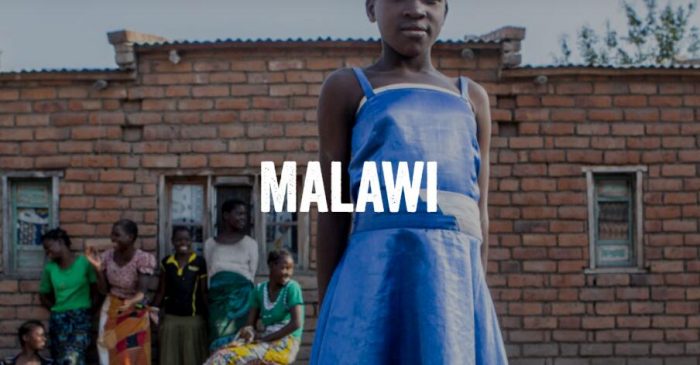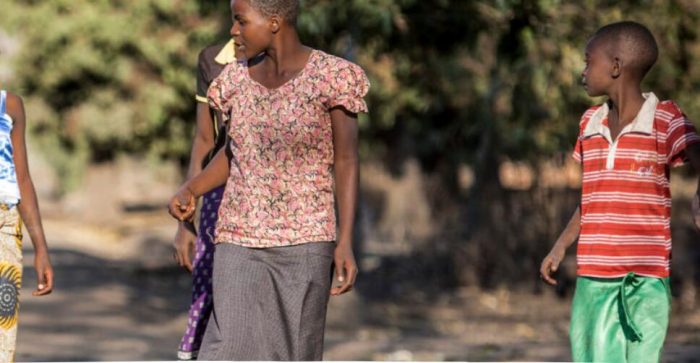Monday, February 14, 2017 is a historic day for girls in Malawi. It is the day when 131 out of 133 MEPs voted in favor of changing the age of marriage from 15 years (with parental consent) to 18 years.
Malawi is located in southern Africa and is ranked number twelve in the world for the highest incidence of child marriage, according to UNICEF. When children are married off, it is often a consequence of poverty, culture, tradition and bad laws. Now the law has been changed in Malawi, but work to get the law to put into practice remains.
Plan International was one of the most important organizations during the advocacy work for the new law to enter into force. The change in the law is the result of persistent lobbying where young activists have done a large part of the work. Plan International knows that children have a unique perspective and a power to change, and therefore continues the fight to stop child marriage in Malawi with young people at the forefront.
Densely populated agricultural nation
The long, narrow country of Malawi is a distinctly agricultural nation and maize is the crop that is grown the most. 80 percent of the population are small farmers and farmers. Due to recurring disasters, the country is largely dependent on foreign aid.
Malawi is one of the most densely populated countries in Africa, especially in the southern parts of the country. Poverty, malnutrition and AIDS have been the cause of increasing death rates in recent decades.
Plan International: children should not be subjected to violence
Plan International has been working for the rights of children and young people in Malawi since 1994. We work with children, young people and their communities to address the structural and fundamental causes of poverty and child vulnerability.
In the country, we work, for example, to improve the health of children and young people through access to primary health care, education on sexual and reproductive issues, safe water and sanitation. We also fight for no children to be exposed to violence and for all children in the country to have access to a qualitative and inclusive primary school education.
An example of an investment made by Plan International in Malawi is to train health care providers in sign language so that they can communicate about sexual and reproductive health with children with hearing impairments.
Education and food security
Climate change and drought require more stable agriculture
We will take advantage of the opportunities that new farming methods provide to streamline and improve our agriculture, and thus also in the future guarantee that we have access to food.
Manjawira F, father and farmer in Mulanje
Plan International wants to promote climate-smart agriculture and teach new cultivation methods. By utilizing and utilizing water from wetlands, the water supply does not become as dependent on rain. In this way, crops can be harvested twice a year. Cassava and sweet potatoes, for example, can both withstand a lot of drought and do not need fertilizer. During the year, 300 small farmers have learned new techniques, and gained new knowledge in how to use crops.
Security and protection
The school should be for everyone
It was a nightmare for me to go to the toilet, both at school and elsewhere because I am in a wheelchair. That’s why I often chose to stay at home. Then Plan International fixed a handicap toilet for my school. Now I like to go there.
Walani C, 14
Children with disabilities have less access to school than children who do not have a disability. They face more obstacles, become discriminated against and are at greater risk of falling victim to violence and abuse. In Malawi, Plan International is working to get the government to earmark funds in its education budget to develop a more inclusive school.
The girls have had enough of child marriage
From being in the top ten list of countries with the highest proportion of child marriages, Malawi has now banned marriage before 18 years. Plan International, together with young people around the country, has run the successful campaign.
19-year-old Memory Banda’s younger sister was only eleven years old when she became pregnant and was forced to marry the father of her unborn child.
– Then I was young and thought it was normal. But I quickly realized what a negative impact it had on my sister. When she came home, I realized that the person who had been my little sister was now completely different, says Memory Banda.
Hopefully no more girl will have to suffer like Memory’s sister. Thanks to a successful campaign, run by Memory among others, Malawi has banned child marriage. Prohibiting child marriage and forced marriage by 2030 is part of the UN’s global sustainability goals. Plan International works side by side with girls around the world to change laws and achieve goals. In Malawi, we have, among other things, supported Memory’s campaign group.
– We are so happy that young people have been involved and taken such a big part in this success, says Lily Omondi, Country Manager for Plan International Malawi.
When the campaign started in March 2015, the age of marriage was 15 years with the parents’ consent. Malawi was in ninth place among the countries in the world in terms of the number of child marriages and around half of all girls were married at the age of 18, according to a report by UNICEF from 2016. But the young people wanted something else. The key to a change in the law was to get support from the president’s wife, who after an event became an ambassador for the issue and supported the demands. Campaign groups around the country raised the issue of how children are affected by child marriage for local and traditional leaders, while the campaign appeared in the media.
So, in February 2017, the law was voted through by a large majority in Parliament.
– That ministers and legislators were courted by the young people themselves and heard their version was crucial. By making their voices heard, these young people have ensured the health and happiness of millions of girls in Malawi, says Lily Omondi.
Facts about Malawi
Capital: Lilongwe
Population: 18 million
Life expectancy: 63%
Infant mortality rate: 39 per 1000 births
Teenage pregnancy: 141 per 1000 girls aged 15-19
Maternal mortality: 634 per 100,000 births
Percentage of children starting school: 96.9%
Literacy literacy: 61.3%
Proportion of women in parliament: 16.7%


